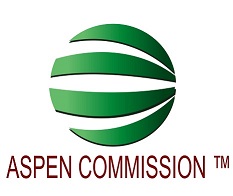ASPEN COMMISSION ™
THE CENTER FOR PHILOSOPHY POLITICS SPIRITUALITY AND SCIENCE ™
Increase partnerships with the private sector and civil-society organizations to mobilize support and resources and shape foreign public opinion. The United States cannot accomplish effective diplomacy and development alone. Strategic partnerships across the public, private, faith-based, and nonprofit sectors help the United States connect with communities and civil society to create shared value, purpose, and vision, and are critical to achieving our national security objectives. Because decision-making is dispersed among state and non-state actors, cultivating relationships is vital. USAID’s Global Development Alliance (GDA) builds partnerships with local and international companies and a range of other partners based on principles of shared interest and value focused on market-based solutions. Working with financial institutions, companies, and other financial providers, USAID facilitates greater private investment to support development objectives in energy, agriculture, and health. USAID works with partners to tackle barriers to investment and to provide technical expertise and tools. Digital engagement, visitor and exchange programs, and local community efforts led by U.S. program alumni help build partnerships that positively influence foreign publics in pursuit of U.S interests. More than 650 public engagement facilities (“American Spaces”) worldwide enable English language learning, people-to-people programs, and youth leadership networks like the Young African Leaders Initiative. The Department of State and USAID will facilitate access for and collaborate with U.S. companies and foundations that invest in workforce skills development for foreign populations, expand digital literacy and access, and foster entrepreneurship ecosystems that support U.S. interests. Strategies for Achieving the Objective The Department and USAID will engage civil society and NGOs, along with the private sector, to maximize our ability to affect positive change, including protecting ethnic and religious minorities and other marginalized populations; promoting religious and ethnic tolerance; and providing emergency assistance to human rights defenders and survivors of abuse. The Department and USAID will develop training focused on non-government entities. Developing sustainable and effective partnerships outside the public sector requires unique skills and tools distinct from those used in government-to-government diplomacy. Successful communication with civil society and foreign publics requires mutual understanding and trust. We must develop and train our workforce to effectively deploy people-to-people and communication programs to generate the strong support and robust local participation necessary to solidify partnerships that produce maximum impact. Cross Agency Collaboration Our strategic partnerships represent a diverse network of organizations, including for-profit businesses, civil society, academic institutions, philanthropic foundations, and diaspora groups. Partners include state and local law enforcement agencies; American and foreign universities; media organizations and journalist advocacy groups; cultural; sports; and youth organizations; religious leaders and religious communities; faith based organizations; and schools.
Risk Shrinking democratic spaces make programs more costly, dangerous, restrictive, or illegal. The Department and USAID use rigorous program reviews to maintain transparency while protecting the security of our partners. Lastly, significant drops in a population’s trust of the United States may constrain willingness to work with the Department and USAID as partners. Project American values and leadership by preventing the spread of disease and providing humanitarian relief.
|

World Markets
-- Teddy Roosevelt, 26th President of the United States of America
Aspen Commission ™ All Rights Reserved 1996-2025
IBS INTERNATIONAL BOARD OF STANDARDS
Aspen Commission Academy of International Relations, Philosphy Politics and Innovation - International Political Foregin Relations Public Policy Council. The Aspen Commission ™ is an Association Registered in Colorado and is also a listed as an Limited Company CO USA.
CEO Commission Join Mission Ethics Home Continuing Ed Government Jobs Awards Degrees Certification newspapers Diplomacy markets Links Careers Disclaimer
Accreditation and Recognition: GAFM * www.GAFM.org * www.CertifiedProjectManager.eu * www.AAFM.org * Certified Project Manager * Certified e-Commerce Consultant * Royal Law Society * Royal Business Society * Royal Business College * Royal Fellows * Royal Economics Academy * Oxford Law School * AAFM * Certified International Project Manager * www.GMentz.com * www.CertifiedProjectManager.org * www.GeorgeMentz.com * www.AAFM.us * www.icecc.com * www.reclaimingspirituality.com *